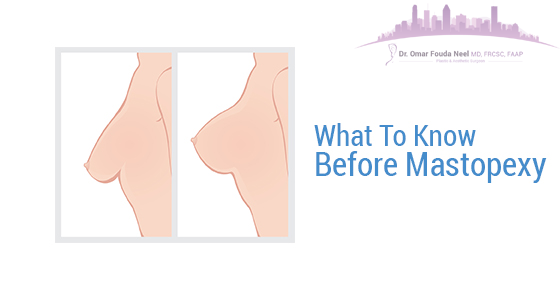What To Know Before Mastopexy
As we age, our skin gradually loses some of its elasticity and volume. This can lead to wrinkles and sagging in lots of areas of the body. Because of their weight, the breasts can be especially vulnerable to sagging. Sagging breasts can be very demoralizing and often rob women of their confidence. However, there is a way to resolve these issues: a mastopexy, more commonly known as breast lift, here in Montreal.

What the procedure achieves:
- Improved shape
With a breast lift, your surgeon removes excess skin and reshapes the breast tissue in order to achieve a rounder and more pleasing breast shape with less sagging. Your surgeon may also be able to reposition your nipples so that they no longer point downward.
- Size considerations
A breast lift does not alter the size of your breasts. However, a breast lift can be combined with either breast reduction or breast implants, depending on your needs. In fact, breast lifts combined with either reductions or augmentations tend to be very successful procedures with very satisfied patients.
How to prepare for a mastopexy:
- Book a consultation
The first step in preparing for a breast lift is your consultation with your surgeon. They will be able to assess your current needs and figure out the best plan to achieve your goals. They will also be able to spot any concerns ahead of time in order to avoid complications.
- Medication plan
Your surgeon may recommend that you stop taking certain non-essential medications or supplements, since some varieties can impede the healing process.

- No smoking
Similarly, if you smoke, your surgeon will probably recommend that you stop smoking in advance of your surgery. Smoking reduces the body’s ability to heal well, so it can compromise the success of a breast lift.
What to expect after your breast lift:
- Take it easy
For the first week or two after your surgery, you should avoid strenuous activity or exercise. You want your incisions to heal well in order to minimize scarring.
- Don’t sleep on your stomach
In addition to being painful, this could interfere with the healing of your incisions.
- Wait to get new bras
There will be some swelling right after your surgery, so if you try to measure your bra size right away, it will be inaccurate. It takes a few weeks for the swelling to completely dissipate. Over several weeks, the shape of your breasts will settle into a more natural position.
- Treat scars after you’re healed
Once your stitches are removed, you can start applying lotions with vitamin E and anti-scar creams.
Questions to Ask Before Mastopexy
Now that you have a clear understanding on the mastopexy process, it’s important that you work closely with your specialist to become more comfortable with the upcoming procedure. During the consultation process, you will have the opportunity to speak with the expert and to ensure you understand all the elements involved in treatment. Below are a few of the questions to ask to help gain more information on the process.
- Am I a good candidate for this process?
Before you begin the long-term process of undergoing a mastopexy, you should ascertain whether you’re the ideal candidate for the treatment process. In answering this question, the specialist will consider your age, your health, your body and your unique physical characteristics. For example, if you have discovered over time that your nipples begin to point downward due to skin stretching, you’re likely a strong candidate for the mastopexy treatment.
- What are the risks and complications?
While the risks and complications are minimal for this type of procedure, it can often be comforting for you to hear about these issues before you undergo the procedure. By asking this question you can ensure the specialist allays your fears. They will point out how rare any complications are from the mastopexy procedure and the seamless recovery process that the vast majority of patients achieve.
- Will my ability to breastfeed be impacted?
This is one of the more common questions specialists receive during the consultations on the mastopexy process. By speaking with your specialist about your breastfeeding options, you’ll discover that most women find that their ability to breastfeed is not impacted by the mastopexy process. The treatment simply lifts the tissue underneath the skin and reshapes the surrounding breast, leaving the biological characteristics of the breast intact.
- Who will be involved in my treatment?
When discussing your treatment with the specialist, it’s the ideal opportunity to learn more about the team members involved in the treatment process. The specialist will detail the work of the nurses and anesthesiologists who will be part of your care team. They will also highlight the step-by-step process and who you will be communicating with at each stage. This can help ensure you’re ready to manage all steps in your treatment effectively for the optimal results over the long-term.
By discovering more on the mastopexy process, you can now make an educated choice about your treatment needs. To learn more, speak with our team today!














